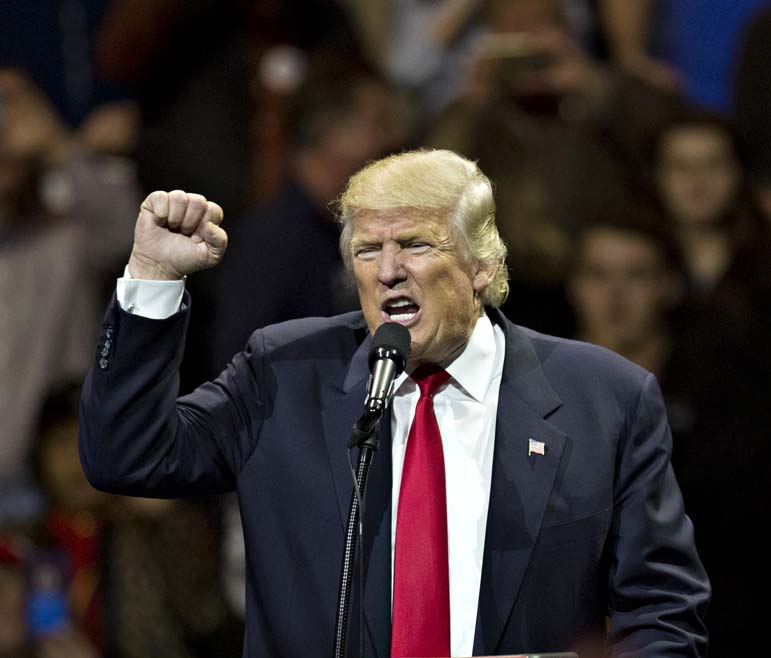 Bloomberg photo by Daniel Acker
Bloomberg photo by Daniel Acker
Surely there were alarmists who thought 2016 might end in an undemocratic coup. But who predicted Democratic opinion leaders would be the ones agitating for it?
For fear that Donald Trump will violate democratic norms, liberals want to have the Electoral College throw out the results of a presidential election and impose their choice on the nation for the first time in our history.
The hypocrisy is rather astonishing. A major theme of the Democrats and the press during the election was (reasonably enough) the absolute imperative of accepting the results. This lasted as a bedrock principle of democratic governance all the way until roughly 4 a.m. Wednesday, Nov. 9, when it became clear that Trump had won and angry protests in the streets, pointless, harassing recounts and calls for an Electoral College coup became the order of the day.
In theory, 37 electors could flip against Trump on Dec. 19, deny him the 270 electoral votes needed to win and precipitate one of the gravest constitutional crises in the history of the republic. If you spin out the scenarios, it's hard to see how Trump would actually be denied the presidency (if no one gets 270 electoral votes, the contest is thrown into the Republican House). So the point of the whole exercise would simply be to disrupt as much as possible the heretofore sacrosanct peaceful transfer of power.
And it's Trump who's the threat to our system? More than anything else, the calls for an Electoral College coup expose a standardless will to power of a left that professes to value democratic procedure.
What else to make of opponents of the Electoral College urging the Electoral College to overthrow an election? The University of Texas law professor Sanford Levinson has called the Electoral College a "menace to the American polity." Yet he is now a signer of a public letter urging members of this menace to re-engineer the November election to his liking.
The electors do have the power in theory to act as a last check on a presidential tyrant. But the norm of electors rubber-stamping the election's winner is so ingrained in our system that any deviation from it would constitute a revolutionary act. The rationales advanced for a radical departure from the practice as established over a couple of centuries of American history are tinny and unconvincing at best.
Literally the first reason Peter Beinart of The Atlantic offers for electors potentially blocking Trump is the president-elect's position on climate change. In other words, Beinart is open to overturning the election to impose his own favored view on a highly contested policy question. And yes, he says he wants to do this in the name of liberty. By this standard, the Electoral College would be justified in blocking a President Ted Cruz, Marco Rubio or Rick Perry - really any Republican in the mainstream of his party on this issue.
Harvard professor Lawrence Lessig wants the electors to award Hillary Clinton the presidency on the basis of her victory on the after-the-fact metric of the popular vote that no one - not the Hillary campaign, the Trump campaign, the press or the voters - focused on during the election. This is inherently arbitrary; rules have meaning only if they are established and agree upon beforehand.
Robert Reich argues that the electors should vote against Trump so long as he doesn't release his tax returns. Trump should indeed release his returns, but this issue was litigated extensively in the fall. What Reich is demanding is that, since voters didn't put appropriate weight on this question in his view or arrive at his preferred conclusion, electors should substitute their own judgment. No one in 200 years would have thought this is a legitimate role of the Electoral College.
Then, there's Russia. John Podesta wants electors to get an intelligence briefing on Russia's hacking during the campaign, which is a way of insinuating that Trump's victory was illegitimate. This, too, was argued about for months prior to the election. Voters had the option of discounting the WikiLeaks revelations given their provenance. To the extent this issue was decisive - and no one can know for certain - voters valued the new information about Hillary even though it was stolen. Again, there is no case for electors overruling them.
(It's also a bit rich seeing the same liberals who defended President Barack Obama's deference to Putin for years suddenly become cold warriors.)
It's not that there aren't legitimate concerns about Trump's temperament and cavalier attitude toward executive power. But these were thoroughly hashed out during the election as well; in fact, Hillary Clinton campaigned on little else. And she lost, narrowly, but decisively. This is what Democrats have to accept.
Once they put away childish things, then perhaps they can rethink their posture more fundamentally. They can revisit all their mindless and shortsighted arguments against obstructionism as such; reacquaint themselves with the separation of powers and especially the role of Congress in our constitutional system (congressional Democrats were happy to see Obama bypass Congress via unilateral fiat for years); learn to appreciate federalism and the limits it to puts on the federal government; and conduct themselves as an opposition party that is worthy of a democratic republic.
The first and most important step, though, is simply to get a grip.
Comment by clicking here.


 Contact The Editor
Contact The Editor
 Articles By This Author
Articles By This Author